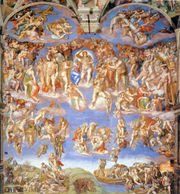
"When all hostility, all resentment, all greed and fear and insecurity are erased from your mind, the state that remains is pure joy. When we become established in that state, we live in joy always...That state of joy, hidden at the very center of consciousness, is the Eden to which the long journey of spiritual seeking leads...The purpose of all valid spiritual disciplines, whatever the religion from which they spring, is to enable us to return to this native state of being--not after death, but here and now, in unbroken awareness of the divinity within us and throughout creation."--Eknath Easwaran, Original Goodness
I recently posted to an online forum this witty remark by Mark Twain:
"One of the proofs of the immortality of the soul is that myriads have believed in it. They have also believed the world was flat."
Someone replied with the following quote from C.S. Lewis:
"Creatures are not born with desires unless satisfaction for these desires exists. A baby feels hunger; well, there is such a thing as food. A dolphin wants to swim; well, there is such a thing as water. Men feel sexual desire; well, there is such a thing as sex. If I find in myself a desire which no experience in this world can satisfy, the most probable explanation is that I was made for another world."
This is how I replied in my own words:
Is it possible that this desire is for something that CAN be, can ONLY BE satisfied in THIS world, but that people have been duped by organized religion from the time they were children to believe that they have to find it in an afterlife that never comes?
I don’t believe in an afterlife. I believe that our personal consciousness dies when our body dies, but that our true nature--the unified totality of existence—continues. I further believe that if there is a heaven, it’s a condition of joy, bliss, or supreme fulfillment in THIS life rather than a place in an afterlife. Unfortunately, if I’m right about this, it would seem that religions that focus on the afterlife play a central role in leading those who embrace them away from true heaven or salvation by persuading them that the pie is in the sky when they die. Thus, religion could ironically be one of the greatest forces working AGAINST salvation rather than for it.





2 comments:
Hi Nagarjuna,
I agree with your sense of an afterlife, or rather, the lack thereof. I especially agree with this: I further believe that if there is a heaven, it’s a condition of joy, bliss, or supreme fulfillment in THIS life rather than a place in an afterlife.
The only major religions that really promise an afterlife are the monotheistic religions. Biblical-period Judaism didn't believe at all in an afterlife until later, when it was believed the Messiah would come and all God's children would be restored.
Several Eastern religions offer another life rather than an afterlife, which you may or may not agree with.
Christianity (and later Islam) are the main culprits for the afterlife belief, but mostly Christianity (Islam grew out of Judaism and Christianity) since Jesus taught of life after death. Many of the gnostic gospels convey life after death as reincarnation. The early Church counsils removed all such references and called those who held such beliefs heretics. The Church could have no real power over their believers is they could be reborn and get another chance at life. Thus the invention of hell, an idea that did not exist as such in Jewish teachings.
This belief system, as you suggest, has made Christianity and Islam "outer" religions in that acts in the world determine one's afterlife. There is little emphasis on prayer or meditation to experience union with God duting this lifetime. Those who do engage in such practices usually discover they have no need of priests, mullahs, or ministers.
As an aside, I like some of Easwaran's thought, but I don't get that he holds the view that we must develop toward enlightenment rather than return to enlightenment (pre/trans fallacy). Am I wrong in this reading (of which I have not done enough)?
Cheers,
Bill
Thanks for your comments, Bill. They seem right on the mark regarding how some major religions have traditionally viewed the afterlife, and how a genuinely spiritual path might well obviate the need for "priests, mullahs, or ministers."
As for Easwaran, I agree with you that his writings seem to imply the "pre/trans" fallaciousness of returning to an original stage of enlightenment rather than developing to a higher, later stage of it. However, I'm not sure how he actually viewed the matter and whether he may not have been exercising a degree of poetic license that doesn't detract from the possibility of walking his eightfold path to a higher or more inclusive level of spiritual development.
Post a Comment